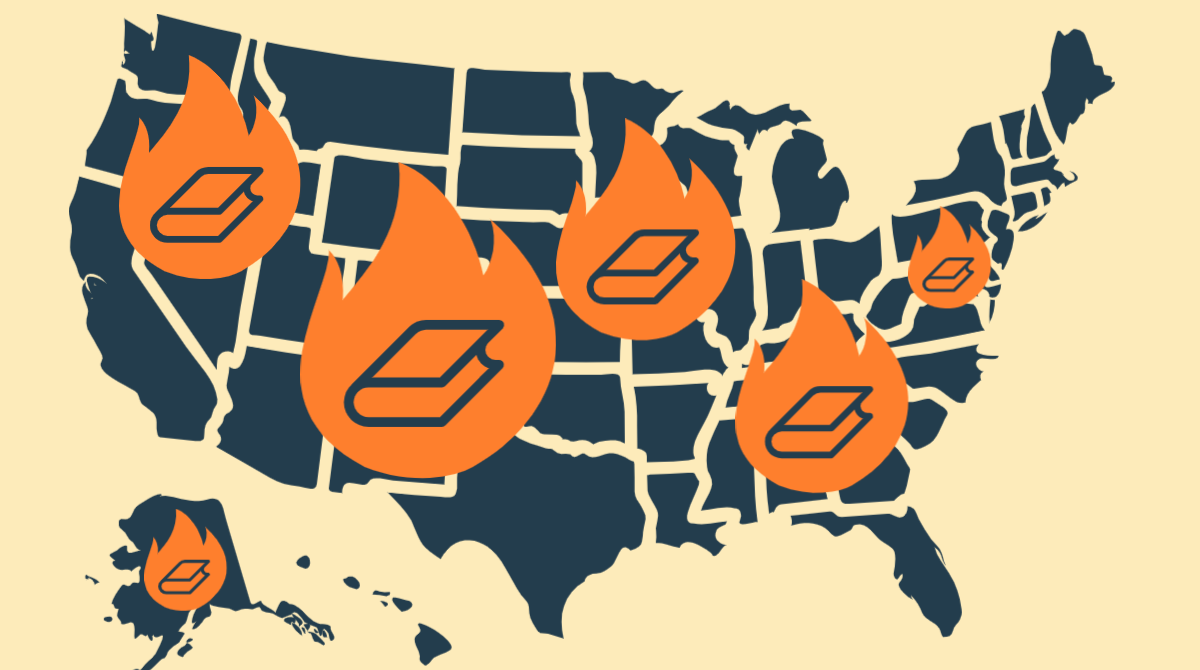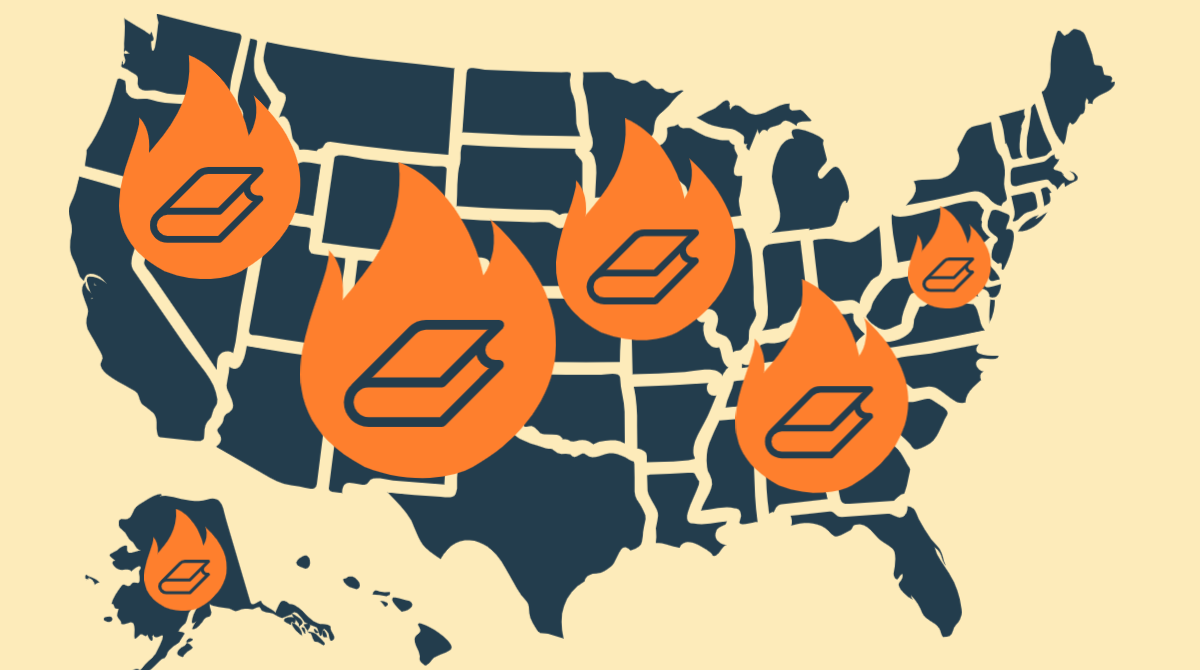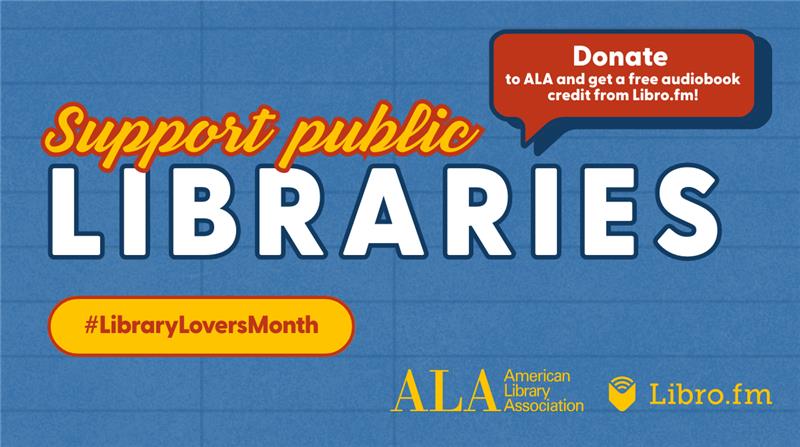Libraries and schools across the country are experiencing unprecedented levels of attempts to ban or remove books from their shelves. I Love Libraries will continue to raise awareness by highlighting attempts to censor library materials, as well as efforts by librarians, parents, students, and concerned citizens to push back against them. This report includes news from Iowa, Massachusetts, North Carolina, and Florida.
Judge blocks Iowa’s ban on school library books that depict sex acts
On December 29, a federal judge in Iowa temporarily blocked enforcement of a law that banned books describing sex acts from public school libraries, reports The New York Times. Judge Stephen Locher said that the law “makes no attempt to target such books in any reasonable way.”
“Instead, it requires the wholesale removal of every book containing a description or visual depiction of a ‘sex act,’ regardless of context,” Locher wrote. “The underlying message is that there is no redeeming value to any such book even if it is a work of history, self-help guide, award-winning novel or other piece of serious literature. In effect, the Legislature has imposed a puritanical ‘pall of orthodoxy’ over school libraries.”
Locher also blocked a portion of the law that imposed limits on instruction about sexual orientation and gender identity before seventh grade.
Republicans nationally have objected to a handful of titles that contain descriptions of sex, but many other books have been swept up in the Iowa crackdown. One school system in Nevada, Iowa, removed dozens of classic works from its shelves, including George Orwell’s 1984, Alice Walker’s The Color Purple, and Aldous Huxley’s Brave New World.
“You have people yanking books off because they’re afraid they’re going to lose their jobs,” said Frederick Sperling, a lawyer for Penguin Random House and several authors, in oral arguments at the federal courthouse in Des Moines.
Massachusetts police apologize for book search in middle school
Massachusetts police apologized for searching an eighth-grade classroom in December for Maia Kobabe’s Gender Queer after an unidentified person complained it contained pornographic images, reports CBS News.
Bodycam footage and police reports showed a plainclothes officer coming to W.E.B. Du Bois Regional Middle School in Great Barrington after hours and speaking with an English teacher, saying, “you can’t present that kind of material to people under 18,” referring to the book. The officer then asked if other books contained similar images and if they knew of another specific teacher who might have the book.
Great Barrington Police Department Police Chief Paul Storti apologized in a statement on social media. “If our involvement caused distrust and alarm, that was not our intention,” Sorti wrote. “I promise you our actions were not meant to disenfranchise anyone or influence school curriculum.”
Massachusetts Gov. Maura Healey responded to the controversy and supported students who have protested the search.
“Book banning has no place in Massachusetts,” said Healey. “Our administration stands with educators who are committed to ensuring that their students have inclusive, comprehensive resources. I’m proud to see these students stepping up to support their teacher, their peers and an inclusive learning environment.”
Bookstore is giving banned books back to the Florida community they were removed from
A bookstore in Asheville, North Carolina, is returning 22,500 books it received from a Florida school district as a result of DeSantis-backed book banning legislation, reports Autostraddle.
More than 47 books were flagged and removed from Duval County Public Schools system in November 2022 as a result of Florida Governor Ron DeSantis’s push for widespread censorship and book bans. In addition to queer and trans titles, many of these books candidly explored racism, colonialism, and activism/organizing in accessible ways for kids.
According to Firestorm Books in Asheville, a contractor tasked with the disposal of the books contacted them and offered to ship the books to them for free. But if they couldn’t take the books, the lot would be destroyed. Firestorm took the books, and now they’re giving them back.
Through a new project called Banned Books Back!, the store will redistribute the confiscated books back to youth in Florida for free. Kids and their allies can fill out an encrypted form to request either picture books for ages 4-8 or chapter books for ages 8-12. Five to six books will be sent per ask, along with zines and stickers.
Florida school district pulls 673 books from teachers’ classroom shelves
The Orlando Sentinel published a two-page print spread December 21 that listed 673 books that have been removed from classrooms in Orange County, Florida, over fears the titles violate the state’s new laws banning “sexual conduct” from public schools.
The list of rejected books, which Orange County Public Schools began compiling last summer, will get another review from district staff, so some could eventually be put back on shelves. But for now, teachers have been instructed to remove any of the books from their classrooms. The removals stem from two laws signed by Florida Governor Ron DeSantis which require media specialists to review books in libraries and classrooms and exclude books that include sexually lewd material or pornography.
The books on the list range from well-known classics to popular contemporary novels, including East of Eden, Paradise Lost, Beloved, A Tree Grows in Brooklyn, The Color Purple, Catch-22, and Brave New World.
Take action
Alarmed by the escalating attempts to censor books? Here are five steps you can take now to protect the freedom to read.
- Follow news and social media in your community and state to keep apprised of organizations working to censor library or school materials.
2. Show up for library workers at school or library board meetings and speak as a library advocate and community stakeholder who supports a parent’s right to restrict reading materials for their own child but not for all
3. Help provide a safety net for library professionals as they defend intellectual freedom in their communities by giving to the LeRoy C. Merritt Humanitarian Fund.
4. Educate friends, neighbors, and family members about censorship and how it harms communities. Share information from Banned Books Week.
5. Join the Unite Against Book Bans movement and visit our Fight Censorship page to learn what you can do to defend the freedom to read in your community.
Subscribe to the I Love Libraries newsletter! You’ll get monthly updates on library news, advocacy updates, book interviews, book info, and more!


